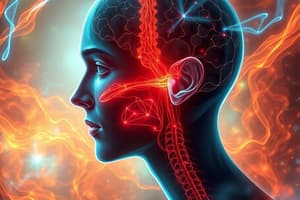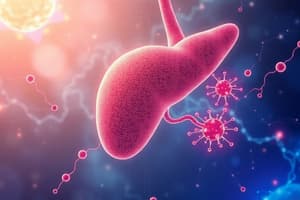Podcast
Questions and Answers
A patient presents with unexplained weight loss, increased heart rate, and difficulty sleeping. Lab results show elevated levels of T3 and T4. Which condition is the most likely cause of these symptoms?
A patient presents with unexplained weight loss, increased heart rate, and difficulty sleeping. Lab results show elevated levels of T3 and T4. Which condition is the most likely cause of these symptoms?
- Addison’s disease
- Hyperthyroidism (correct)
- Hypothyroidism
- Cushing's disease
A patient is diagnosed with Type I diabetes. Which of the following best describes the underlying cause of this condition?
A patient is diagnosed with Type I diabetes. Which of the following best describes the underlying cause of this condition?
- Impaired kidney response to antidiuretic hormone (ADH)
- Excessive secretion of insulin due to prolonged hyperglycemia
- Autoimmune destruction of pancreatic beta cells (correct)
- Insulin resistance in target tissues
A patient presents with muscle weakness, fatigue, and increased pigmentation of the skin. Blood tests reveal low cortisol and aldosterone levels. Which of the following conditions is most consistent with these findings?
A patient presents with muscle weakness, fatigue, and increased pigmentation of the skin. Blood tests reveal low cortisol and aldosterone levels. Which of the following conditions is most consistent with these findings?
- Cushing's disease
- Diabetes insipidus
- Addison's disease (correct)
- Syndrome of inappropriate ADH (SIADH)
A patient exhibits symptoms of polyuria, polydipsia, and hypernatremia. Further testing reveals that the patient's kidneys are not responding to ADH. Identify the most likely diagnosis.
A patient exhibits symptoms of polyuria, polydipsia, and hypernatremia. Further testing reveals that the patient's kidneys are not responding to ADH. Identify the most likely diagnosis.
A patient is diagnosed with a condition characterized by excessive cortisol production. Which of the following clinical manifestations is least likely to be associated with this condition?
A patient is diagnosed with a condition characterized by excessive cortisol production. Which of the following clinical manifestations is least likely to be associated with this condition?
Flashcards
Hyperthyroidism
Hyperthyroidism
Excessive thyroid hormone production, leading to increased metabolism.
Hypothyroidism
Hypothyroidism
Insufficient thyroid hormone production, resulting in slowed metabolism.
Type I diabetes
Type I diabetes
An autoimmune condition that destroys insulin-producing beta cells in the pancreas, leading to absolute insulin deficiency.
Cushing’s disease
Cushing’s disease
Signup and view all the flashcards
Addison’s disease
Addison’s disease
Signup and view all the flashcards
Study Notes
- These are several conditions that affect the endocrine system and hormone regulation.
Hyperthyroidism
- Overproduction of thyroid hormones (T3 and T4) by the thyroid gland.
- Symptoms include weight loss, rapid heartbeat, sweating, and anxiety
Hypothyroidism
- Underproduction of thyroid hormones.
- Leads to weight gain, fatigue, and depression
Type 1 Diabetes
- Autoimmune destruction of insulin-producing beta cells in the pancreas.
- Results in insulin deficiency, requiring lifelong insulin therapy
Type 2 Diabetes
- Insulin resistance and impaired insulin secretion.
- Associated with obesity, managed through diet, exercise, and medication
Syndrome of Inappropriate ADH (SIADH)
- Excessive release of antidiuretic hormone (ADH) from the pituitary gland.
- Causes water retention, leading to hyponatremia (low sodium levels)
Diabetes Insipidus
- Deficiency of ADH or resistance to its effects.
- Results in excessive thirst and excretion of large amounts of dilute urine
Cushing’s Syndrome
- Prolonged exposure to high levels of cortisol.
- Causes weight gain, high blood pressure, and skin changes
Addison’s Disease
- Adrenal insufficiency.
- Results from damage to the adrenal glands, leading to deficiency of cortisol and aldosterone.
- Symptoms include fatigue, weight loss, and low blood pressure
Studying That Suits You
Use AI to generate personalized quizzes and flashcards to suit your learning preferences.




